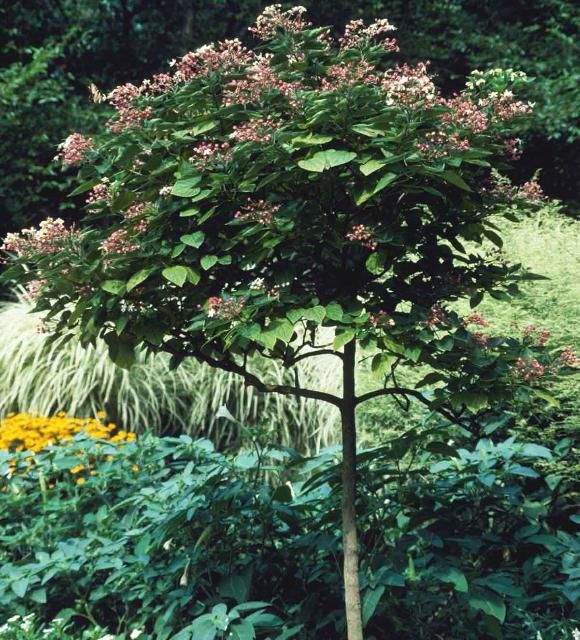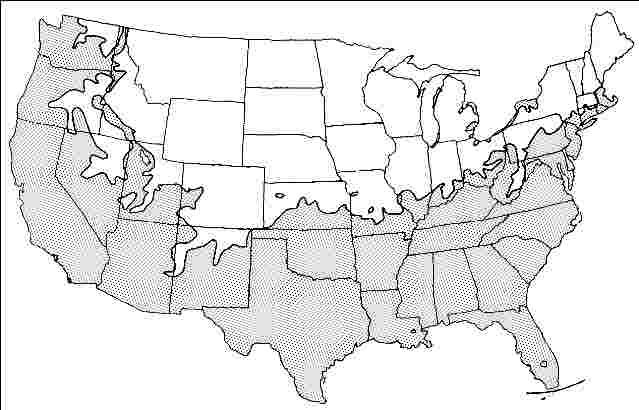Introduction
This non-native deciduous shrub or small tree is usually 6 to 10 feet in height with multiple trunks, creating much the appearance of a large shrub. A small tree can be produced by staking the plant until a sturdy trunk develops. The dark green leaves are oval, 5-inches-long, and covered with a soft fuzz. In late summer in the full sun, the tree is festooned with beautiful clusters of delightfully fragrant, white, tubular flowers. The fruits which follow are blue/green and metallic-looking. Flowers and fruits can sometimes be found on the plant at the same time.

Credit: Ed Gilman
General Information
Scientific name: Clerodendron trichotomum
Pronunciation: kleer-oh-DEN-drawn trick-oh-TOE-mum
Common name(s): Harlequin glorybower
Family: Verbenaceae
USDA hardiness zones: 6A through 11 (Fig. 2)
Origin: not native to North America
Invasive potential: little invasive potential
Uses: container or planter; trained as a standard; specimen; deck or patio; espalier
Availability: not native to North America

Description
Height: 6 to 12 feet
Spread: 6 to 10 feet
Crown uniformity: irregular
Crown shape: round, upright/erect
Crown density: moderate
Growth rate: moderate
Texture: medium
Foliage
Leaf arrangement: opposite/subopposite
Leaf type: simple
Leaf margin: entire
Leaf shape: elliptic (oval), ovate
Leaf venation: pinnate
Leaf type and persistence: deciduous
Leaf blade length: 4 to 8 inches, 8 to 12 inches
Leaf color: green
Fall color: no color change
Fall characteristic: not showy
Flower
Flower color: red
Flower characteristics: showy
Fruit
Fruit shape: round
Fruit length: less than .5 inch
Fruit covering: fleshy
Fruit color: blue
Fruit characteristics: does not attract wildlife; not showy; fruit/leaves not a litter problem
Trunk and Branches
Trunk/bark/branches: branches droop; not showy; can be trained to one trunk; thorns
Pruning requirement: needed for strong structure
Breakage: resistant
Current year twig color: green, reddish
Current year twig thickness: very thick
Wood specific gravity: unknown
Culture
Light requirement: full sun
Soil tolerances: clay; sand; loam; acidic; well-drained
Drought tolerance: moderate
Aerosol salt tolerance: unknown
Other
Roots: not a problem
Winter interest: no
Outstanding tree: no
Ozone sensitivity: unknown
Verticillium wilt susceptibility: unknown
Pest resistance: resistant to pests/diseases
Use and Management
This large shrub or small tree can grow more like a vine if it is not trained and pruned. It can be used near the patio or deck as a flowering ornamental, or placed in a container in a prominent location for display. Not the best looking plant when not in flower, you may want to hide it for 10 months and then 'bring it out' when it flowers.
Harlequin glorybower should be grown in full sun or partial shade with sufficient room to allow the plant to spread out. Often the bottom half of the plant appears leggy and should be camouflaged by underplantings. Sprouts and suckers regularly develop at the base of the plant.